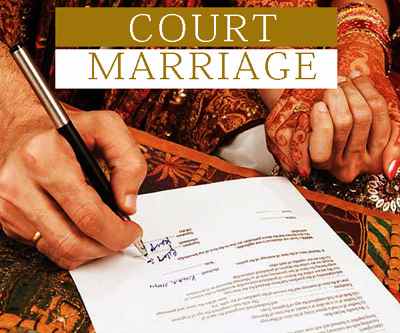Procedure Of Court Marriage
Procedure Of Court Marriage – Court marriage, also known as civil marriage or legal marriage, is a formal union between two individuals recognized by law. It offers a straightforward and legally binding alternative to traditional marriage ceremonies. This article aims to provide a step-by-step overview of the procedure of court marriage, shedding light on the requirements, documentation, and legal aspects involved.
Court marriage, conducted in a civil court or before a marriage registrar, offers a practical alternative to traditional ceremonies. Court marriage serves as a legally recognized and efficient avenue for couples seeking to formalize their union. If you are willing to perform a court marriage you need to know various procedural aspects involved in court marriage, ensuring a clear understanding of the necessary steps and requirements.
Eligibility And Requirements Under Procedure Of Court Marriage
Court marriage not only upholds the principles of equality and personal freedom but also offers couples the opportunity to navigate their marital journey on their terms, transcending cultural, religious, and societal constraints.
- Age Criteria: Meeting the age limits stipulated by the applicable legislation is one of the most important qualifying conditions for judicial marriage. Generally, the bride must be 18 years old and the groom must be 21 years old to get married, however, this might vary by country. The purpose of these age restrictions is to ensure that married persons have the maturity and competency required by law to make informed decisions about their union.
- Permission From Both Parties: both parties’ approval A judicial marriage requires the approval of both parties. To enter into the marital bond, both parties must freely and willingly offer their permission without any force, deception, or undue influence. This requirement assures that the marriage is founded on mutual respect and devotion, and it also represents the notion of individual autonomy.
- Restrictions On Prohibited Partnerships: Court marriage also places limitations on such partnerships. These restrictions aim to prevent marriages that are considered incestuous or against societal norms. Close blood relatives, such as siblings or parent-child relationships, typically fall within the prohibited degrees of relationship. It is essential to ensure that the couple does not share such prohibited relationships to maintain the legality and validity of the court marriage.
- Marital Status Requirements: Before proceeding with court marriage, individuals are often required to meet certain marital status requirements. These requirements may include being unmarried, divorced, or widowed, depending on the specific laws and regulations governing court marriages in a particular jurisdiction. The purpose is to ensure that the individuals seeking court marriage are legally eligible to enter into a new marital relationship.
Documentation And Preparations For Court Marriage
- Application Form: To initiate the court marriage process, couples are required to complete an application form provided by the relevant authorities. This form collects essential details about the individuals, such as their names, addresses, occupations, and other pertinent information.
- Proof Of Identity: Valid proof of identity documents, such as passports, driver’s licenses, or national identification cards, are typically required to establish the identity of the individuals involved in court marriage. These documents help verify the identities of the applicants and ensure accuracy and authenticity throughout the process.
- Proof Of Age: Proof of age, such as birth certificates or government-issued identification documents, is a crucial requirement in court marriage. It serves to establish that both individuals meet the legal age requirements for marriage and aid in preventing underage marriages.
- Residence Proof: Couples are often required to provide proof of residence to establish their current address and jurisdiction. This can be done through documents like utility bills, rental agreements, or any other valid proof of address recognized by the authorities.
- Passport-Sized Photographs: Submission of recent passport-sized photographs of both individuals is a common requirement in court marriage. These photographs are included in the official records and marriage certificate, helping in identification and documentation purposes.
- Affidavit Of Marital Status: In certain cases, an affidavit of marital status may be necessary. This legal document attests to the individual’s current marital status, confirming that they are unmarried, divorced, or widowed, as required by the applicable laws.
- Witnesses: Court marriage often necessitates the presence of witnesses during the ceremony. The number and requirements for witnesses may vary depending on the jurisdiction. Witnesses provide their testimonies to validate the marriage and ensure the authenticity of the proceedings.
Application And Registration Process Of Court Marriage
- Submission Of Application: Once all the necessary documents are gathered, the couple must submit their completed application form along with the required supporting documents to the designated authority or marriage registrar. The application form serves as an official request to proceed with the court marriage process.
- Verification And Publication Of Notice: Upon the submission of the application, the authorities undertake a verification process to ensure the accuracy and validity of the information provided. In some jurisdictions, a notice of the intended marriage is published to allow for any objections or legal impediments to be raised by the public. This notice period aims to ensure transparency and allow any valid concerns to be addressed.
- Waiting Period, If Applicable: In certain cases, there may be a mandatory waiting period after the notice has been published before the marriage can be solemnized. This waiting period allows time for any objections to be raised or legal procedures to be completed. The duration of the waiting period varies depending on the jurisdiction and local regulations.
- Marriage Registration: Following the completion of the necessary procedures, the court or marriage registrar schedules a date for the solemnization of the marriage. The couple and their witnesses must be present on the designated day. The marriage ceremony itself is usually a simple and brief affair, conducted in the presence of the authorized officer or registrar. The couple exchanges vow and sign the marriage register or document to formalize the union.
- Issuance Of Marriage Certificate: Upon the completion of the court marriage ceremony, a marriage certificate is issued to the couple. This certificate serves as legal proof of their marriage and is often required for various purposes, such as changing marital status on official documents or applying for spousal benefits.
Take Away
If you’re seeking assistance with registering a court marriage, either through a straightforward or Tatkal registration, our team of experts is here to help. Amit Gupta, an experienced attorney, specializes in managing civil cases, particularly those related to marriage registration and court marriages. We have a track record of successfully helping couples legally tie the knot, thanks to our strong work ethics and relevant industry experience.
Throughout the process, guidance and direction are crucial, and Advocate Amit Gupta is well-versed in both parties’ advantages and disadvantages, legal obligations, police protection rights, and government programs for interactive marriages. As a result, he has become a dependable and trustworthy legal advisor for court marriages and love marriages.







